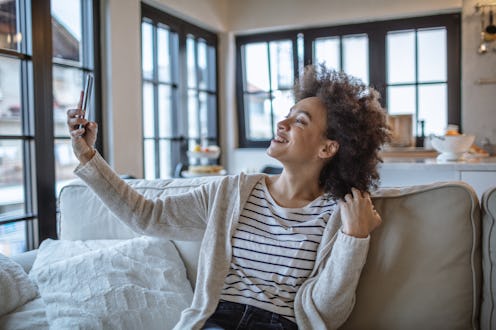Life
Those Viral IG Challenges Are Actually Really Good For Your Brain, Experts Say

For the first time in your life, you're feeling an urge to do TikTok dances and Instagram challenges. You might even be thinking about starting a crafting YouTube for the #cottagecore clout. You might feel awkward as hell, but viral social media challenges can be a mental health lifeline right now.
"Many people are feeling lonely and isolated during this global pandemic," therapist Heidi McBain LMFT tells Bustle. "Digital communities can be a great way to help our mental health and keep us connected to others."
The mental health benefits of collective social media activities, whether it's doing Quiplash over Zoom, a family pub quiz, or digging out your old photos for the #MeAt20 challenge, are real. Their biggest boost is social.
"Digital communities can be a way to bridge the gap between the social connection which we need and crave as social beings, and the physical distance and restrictions we are living in right now," Dr. Joshua Klapow Ph.D., a clinical psychologist, tells Bustle. "[They] offer us a way to gather in groups that is core to our human existence."
Research shows that loneliness can have serious health effects for our bodies and our brains. A study of over 15,000 people published in BMC Psychiatry in 2017 found that lonely women in particular were more likely to feel depressed and anxious, smoke, and visit their doctors more often. Connecting to others online can help moderate that: one study published in Computers In Human Behavior in 2016 found that sharing images in particular was very good for helping people feel less isolated.
Sharing innocuous videos on platforms like TikTok can also help you deal with your emotions. "These communities can also help normalize how many of us are feeling," McBain says. A lot of people are experiencing heightened level of stress and anxiety, grieving the loss of everyday life and planned future events, or feeling sad about their lack of in-person support systems, she says. Dr. Klapow says that social media can be really helpful as a support system, even if it's not a full replacement for an in-person hug.
Just talking about your day, showing off your baking, or getting tips on your nice new broad bean shoots can help mental health, Dr. Klapow says. "We can share ideas, fears, and perspectives. As basic as these actions are, they are also core to our existence as social organisms," he says.
Trying an Insta challenge and falling over halfway through can also lift your spirits. "The humor that’s on social media can also help us all feel a little more emotionally connected to one another and a little less like we’re living on our own private islands," McBain says. Depressing memes might not be helping you, though. A meta-analysis of 37 studies linking mental health and humor published in Scandinavian Journal of Psychology in 2018 found that self-defeating humor styles might not be great for mental health outcomes. It's likely that downbeat jokes don't really make you more optimistic.
The downside to social media challenges right now, Dr. Klapow says, is that they can show everything we're missing. "Social media is our portal to every part of our life that has been restricted, from entertainment to social connection," he says. He cautions that too much time watching other people can make you feel more disengaged from the world around you, which could lead to feelings of depression or anxiety down the road.
If you're holding yourself back from showing off your sourdough bread to your followers, just try it. "Digital communities bring a sense of purpose that we’re doing our best to get through this hard time in a meaningful way," McBain says. And laughing over your horribly burnt first attempt with your friends can be truly therapeutic, too.
Experts:
Dr. Joshua Klapow Ph.D., clinical psychologist
Heidi McBain LMFT, therapist
Studies cited:
Beutel, M.E., Klein, E.M., Brähler, E. et al. (2017) Loneliness in the general population: prevalence, determinants and relations to mental health. BMC Psychiatry, 17, 97. https://doi.org/10.1186/s12888-017-1262-x
Gao J, Zheng P, Jia Y, Chen H, Mao Y, Chen S, et al. (2020) Mental health problems and social media exposure during COVID-19 outbreak. PLoS ONE 15(4): e0231924. https://doi.org/10.1371/journal.pone.0231924
Pittman, M., & Reich, B. (2016). Social media and loneliness: Why an Instagram picture may be worth more than a thousand Twitter words. Computers in Human Behavior, 62, 155–167. https://doi.org/10.1016/j.chb.2016.03.084
Schneider, M., Voracek, M., Tran, U.S. (2018) "A joke a day keeps the doctor away?" Meta-analytical evidence of differential associations of habitual humor styles with mental health. Scand J Psychol, 59(3):289-300. doi: 10.1111/sjop.12432.